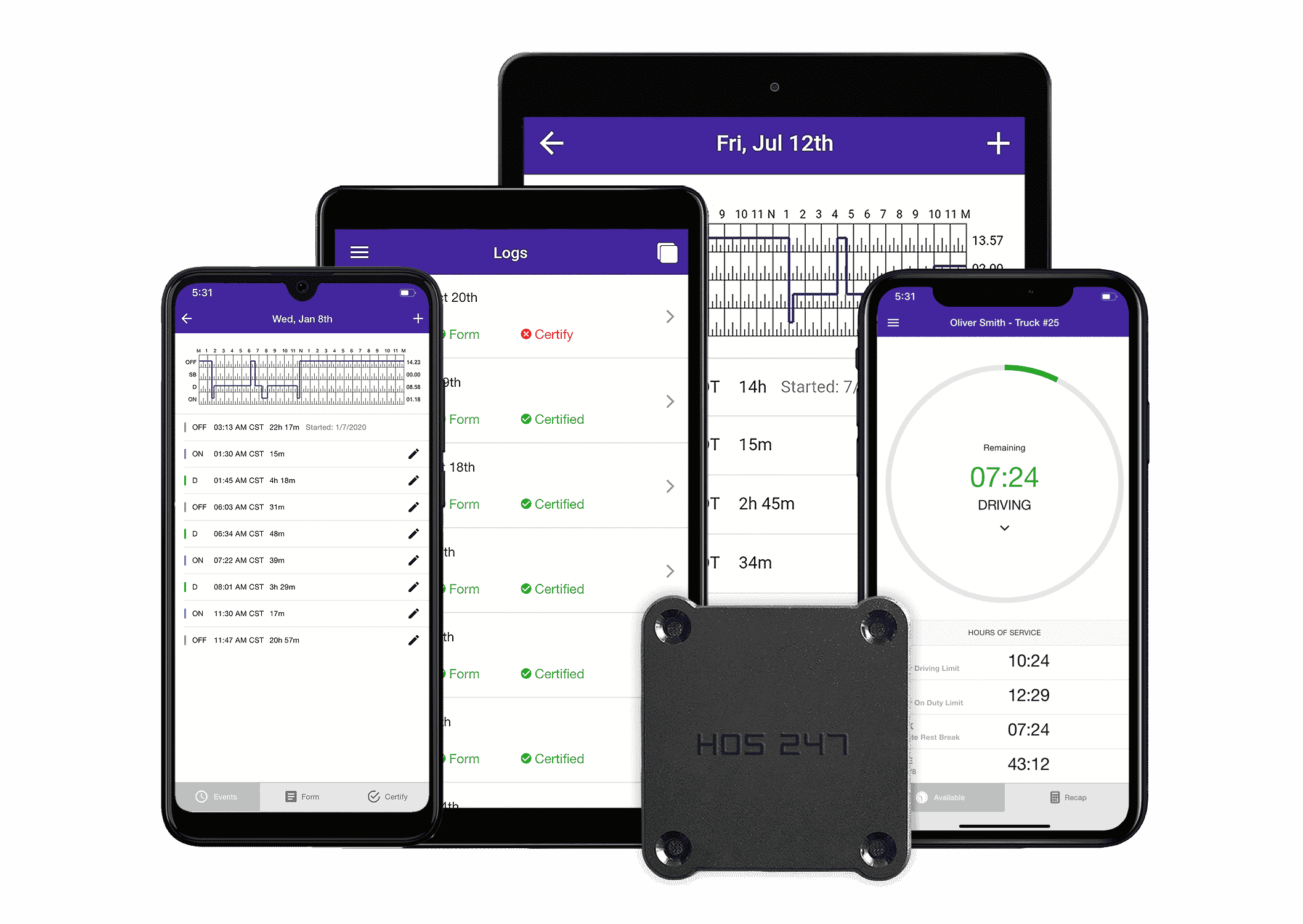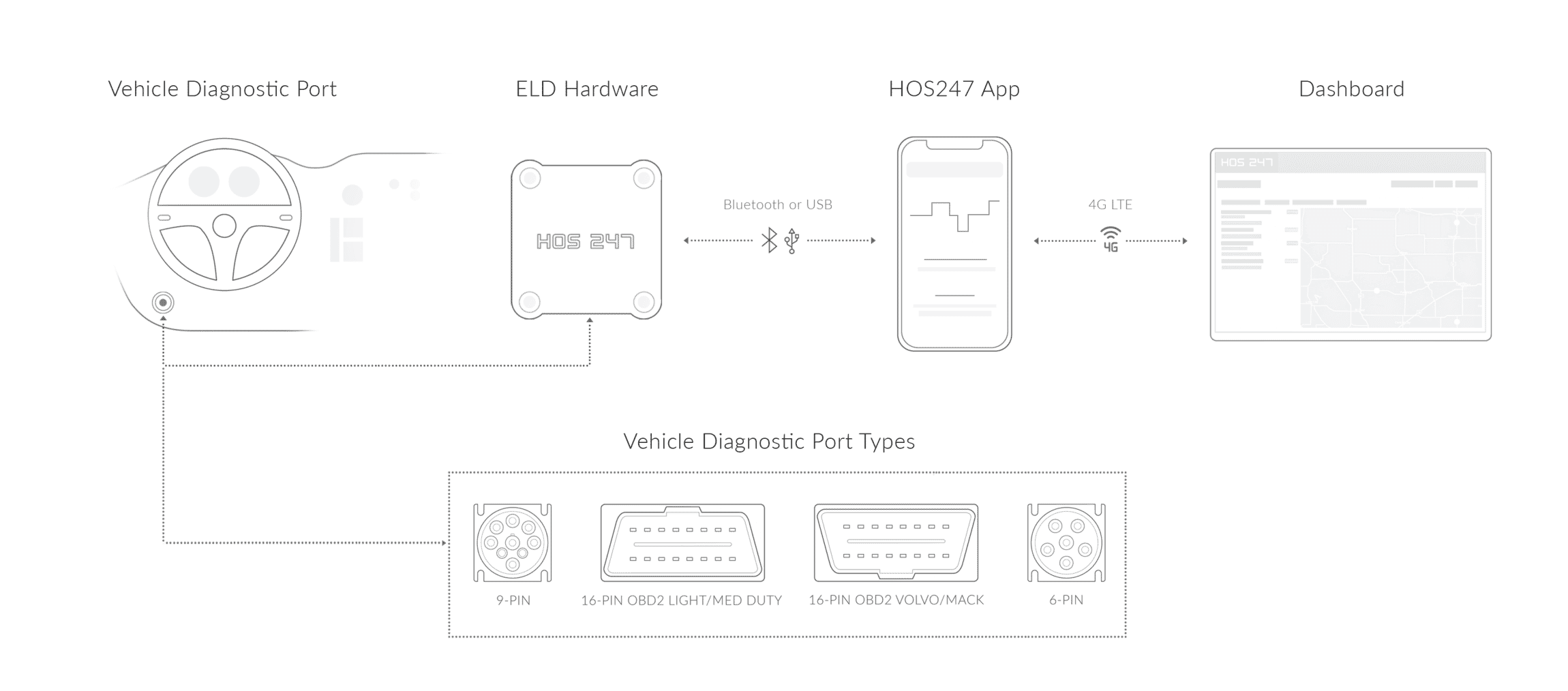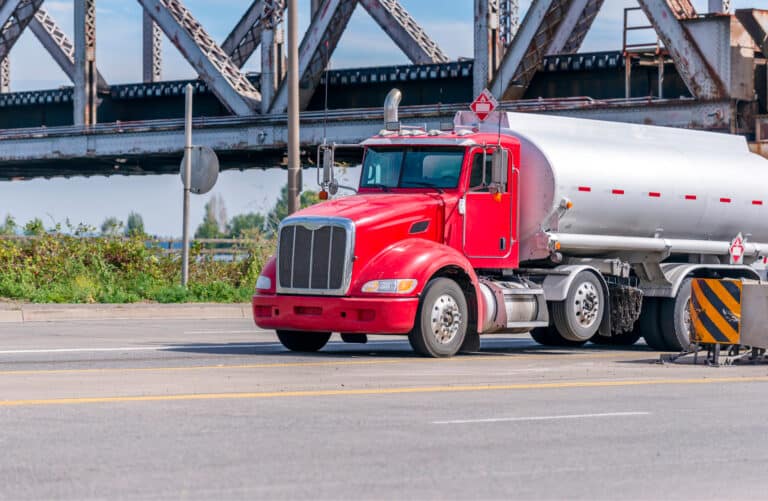Trucking businesses will have to rely on ELD providers to stay Transport Canada compliant once the ELD mandate is in full enforcement. That is why choosing a reputable company with an efficient electronic log book for sale is so important. HOS247 offers an advanced elog solution that is dependable and easy to use.
Who Needs Electronic Log Books and Who Doesn’t?
Most drivers who need to maintain records of duty status (RODS) typically need to use electronic log books. This includes drivers of commercial motor vehicles, trucks, and buses, although there are a few exemptions. In the following cases, electronic logs are not required, but RODS must be kept on paper:
- Holders of a special permit, for instance, for a research or pilot project or for oil well service vehicles.
- Carriers operating under a statutory exemption.
- Vehicles under a rental agreement for 30 days or less.
- Vehicle models older than the year 2000.
How to Choose the Right Electronic Logbook
There is a lot to consider when choosing the best electronic log book for sale, and cost is just one of the factors. According to Transport Canada regulations, commercial vehicles must be equipped with certified electronic logging devices. Three certification bodies have been accredited to test the hardware and software of submitted ELDs and certify them. This process is meant to ensure that the devices are tamper-proof and meet all specified standards.

What to Look for in an Electronic Log Book
While electronic log books may have a wide variety of features, some features carry more weight than others. At a minimum, look for the following so you can ensure your drivers are happy with the system:
- Great reviews. Don’t take the provider’s word for it. Instead, look for reviews from actual users on sites outside of the provider’s main website. Check unbiased platforms such as the Apple App Store and Google Play Store.
- Ease of use. If your team struggles to use the ELD technology, they’ll either avoid using it altogether or waste valuable time trying to understand it. An electronic logbook should help carriers and drivers, not hinder their success. Look for elogs that are intuitive and easy to use.
- Accessible technical support. When stuck on the road as a driver or stuck in the office trying to manage a fleet, struggles with software are an unnecessary headache that can waste valuable time during a given day. Your provider should be available to help. Test this out by calling the provider’s support line at various times during the day. If it is difficult to reach someone, keep on looking for alternatives.
- No proprietary hardware. Some providers require drivers to use the provider’s tablets instead of allowing the drivers to simply download an app and use their own smartphone or tablet. Requiring drivers to use proprietary hardware isn’t just inconvenient; it also adds unnecessary costs.
Avoid These Red Flags When Shopping for Electronic Log Books
There are certain red flags that should immediately warn carriers about the quality of an electronic driver log book:
- Long-term contracts. Some providers will try to lock customers into long-term contracts. If a provider tries to have you sign a deal that’s more than one year long and doesn’t let you try the product first, you might want to find a more flexible provider.
- Experience. An ELD provider that just started creating and selling elog devices isn’t as familiar with the technology and needs of fleets and drivers. It also raises the question of whether they’ll be around in the long run.
- Logbooks programmed for US HOS. Although the U.S. and Canadian ELD mandates have much in common, there are certain standards that differ. Carriers operating in Canada must make sure their electronic logbook supports Canadian HOS rules and regulations.
HOS247 Is a Market-Leading Enterprise in Driver Log Books
The transportation industry relies on HOS247 for driver log books and high-quality hardware due to our track record and reliability in providing elog solutions. Benefits of choosing HOS247 include:
- Top-rated customer support. You’ll never have to worry about accessing support when you need it. Our multilingual team speaks English, Spanish, Polish, and Russian, and they are available to help seven days a week.
- No long-term contracts. We will not make you sign any contracts or ask you to make any long-term commitments.
- Two-week trial period. We have a trial period so you can get to know our ELD solution. If you are not happy with it, you can return it for a full refund within the first two weeks and get your money back.
- Compatibility. Our log book app works great with Android and iOS tablets and smartphones and out high-quality hardware ensures an optimal Bluetooth connection.
- Flexibility. We offer the flexibility for carriers of all sizes to choose the features they need for their fleet. Monthly plans can be scaled up or down in those needs change.

Are Log Book Apps Transport Canada-Compliant?
As we have already said, compliance is incredibly important when researching electronic log books for sale. However, it is important to realize that drivers cannot simply download the app and assume they’re compliant.
Transport Canada states that ELDs are engine-connected devices that directly record hours of service (HOS) and RODS information. An electronic log book app cannot do that on its own, as the app itself is not connected to the vehicle. Instead, it’s the electronic logging system as a whole (software and hardware) that records that information and needs to be certified.
Nonetheless, the electronic log book app is an essential part of the elog solution, as it is used to display the information that the device records. Drivers with HOS247 elog solutions can use their own tablet or mobile device to display this information.
To be compliant with the ELD mandate, drivers need a tamper-resistant device connected to their engine. The logbook app is simply used to provide access to the recorded information.
Why Switch to a Better Electronic Logbook?
Carriers should recognize if a switch to a better electronic log book provider is needed before the mandate comes into full effect. Here are five signs that it’s time to make the switch:
- Lack of support. One common complaint among drivers and fleet managers is that they can’t find technical support when they need it—and even if they can reach support, the person at the other end of the line can’t answer their questions. This can interfere with drivers being able to do their jobs efficiently, which is bad for business.
- Complicated administrative tasks. Log book apps should make managing drivers and their logs easier, not more difficult. Carriers should be able to quickly access driver logs and other information to make their jobs easier and perform tasks more quickly. If back-office tasks are too complicated, it’s time to find a logbook that works with the back office, not against it.
- Disliked by drivers. If drivers don’t like the technology they’re being told to use, they are more likely to make mistakes with it or avoid using it altogether. Driver feedback is an important consideration when assessing an ELD solution.
- Hidden fees. If a price seems too good to be true, it probably is. Many carriers have found themselves stuck in contracts that keep getting more and more expensive because their provider tacked on fees without being transparent upfront. This should raise concerns about whether the provider is trustworthy.

I’ve co-founded, built and managed several transportation-related businesses. Now, I’m a founder and CEO of HOS247 – an AI Transportation Platform for trucking companies, freight brokers and other logistics operations. We are transitioning old-style operations to technology-advanced logistics entities and help them to grow their businesses. ELDs (electronic logging devices), fleet tracking and management 2.0 combined with AI-powered dispatch tools.












The main requirement for any electronic logging device is compliance with Transport Canada’s ELD mandate. However, there are many other factors that turn out to be crucial when looking for a reliable provider. In this article, we discuss some red

The advantages of using GPS trackers are significant, including enhanced safety, reduced fuel costs, increased productivity, and better communication, all of which translate into lower operational costs. By enabling fleet managers to monitor and manage vehicles and assets in real-time,

Choosing the Best Vehicle Driver Log Book Solution in Canada As a trucker, navigating the complex world of electronic logging devices (ELDs) and Transport Canada’s ELD mandate can be a daunting task. From learning the technical aspects of ELDs to
